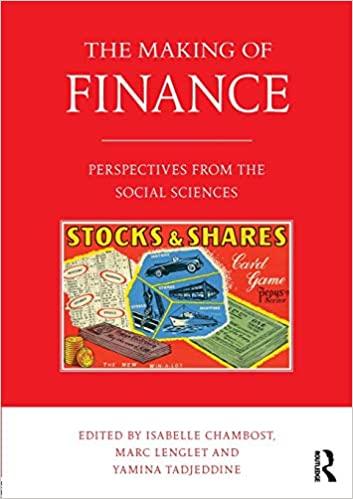Question
Q 3 to Q 11: You have just become the new finance director (CFO) at Delta inc, a U.S. based company. Congratulations! Delta inc has
Q 3 to Q 11:
You have just become the new finance director (CFO) at Delta inc, a U.S. based company. Congratulations!
Delta inc has just sold a large number of computers to an Australia company in Melbourne. As a result of the computer sales, your boss (the CEO) has told you that, in 90 days from today, Delta inc will receive 2M Australian dollars (AUD, here 2M means 2 million AUD). Naturally, you (and the CEO) want to maximize the U.S. dollar value of this money. Your boss (the CEO) has told you that, for Delta inc to make an overall profit on the sale of computers to Australia, Delta inc must make at least 1.42M USD (i.e., at least 1,420,000 USD) proceeds. You definitely want to keep your boss happy!
(You should assume that 90 days is exactly a quarter of a year (to simply calculations)).
You look at Bloomberg for market data and you see:
U.S. annualized interest rate (for 90 days) is 0.5% p.a.
AUD annualized interest rate (for 90 days) is 3.5% p.a.
Spot rate is 0.725 USD per AUD (we assume no bid-ask spread for simplicity)
90 Days forward rate is 0.721 USD per AUD (we assume no bid-ask spread for simplicity)
The price (premium) of call options (exercise price is 0.725 USD per AUD) is $0.023 (i.e., 0.023 USD per AUD).
The price (premium) of put options (exercise price is 0.727 USD per AUD) is $0.035 (i.e., 0.035 USD per AUD).
For the purposes of this question, you estimate (perhaps via the advice of an economic forecasting company)
that the USD per AUD spot rate 90 days from today is going to be:
Either
Scenario A: it will be 0.7975 USD per AUD (a 10% appreciation of the AUD)
Or
Scenario B: it will be 0.6525 USD per AUD (a 10% depreciation of the AUD)
The aim of this series of questions is to see if you are better off using the strategy of (a) no hedge, (b) a forward hedge, (c) an option hedge or (d) a money market hedge. We will do this by doing a scenario analysis where we examine (in turn) the U.S. dollar proceeds (of the 2M AUD) in each of the two scenarios for each strategy (i.e., (a), (b), (c), (d)).
Here, as a reminder, money market hedge means you can borrow (or lend) in AUD (or USD) at the interest-rates above
in such a way as to convert the 2M AUD into USD received 90 days from now. In every answer, give your answer to the nearest USD.
Q 9: In scenario A (exchange rate will be 0.7975 USD per AUD) and strategy (d) (money market hedge), what are your USD proceeds? Q 10: In scenario B (exchange rate will be 0.6525 USD per AUD) and strategy (d) (money market hedge), what are your USD proceeds?
Q 11: Given your answers to Q 3 to Q 10, what do you feel you can most accurately say? Pick the best choice. a) Not hedging (strategy (a)) is best because Delta inc will be better off whatever the exchange rate turns out to be. b) Mindful of my boss's instructions, I am going to do the forward hedge (strategy (b)). c) I am definitely going to do the option hedge (strategy (c)) because it always matches or exceeds my boss's requirements. d) Mindful of my boss's instructions, I definitely believe the money market hedge (strategy (d)) is best.
Step by Step Solution
There are 3 Steps involved in it
Step: 1

Get Instant Access to Expert-Tailored Solutions
See step-by-step solutions with expert insights and AI powered tools for academic success
Step: 2

Step: 3

Ace Your Homework with AI
Get the answers you need in no time with our AI-driven, step-by-step assistance
Get Started


